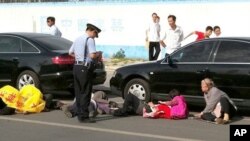Beijing's police do a remarkable job of silencing pubic displays of dissent, but occasionally the desperate find dramatic new ways of airing their grievances. This was the case on Friday June 3, when a small group of petitioners from Fujian province gathered in front of the U.S. Embassy in Beijing and appeared to attempt to commit suicide.
While there were scores of witnesses for Friday's protest, the details remain vague. Ming Pao, a Hong Kong newspaper, reports that Chen Jiafa was among a group of petitioners from Fujian who came to Beijing on June 3. The newspaper says Chen's daughter-in-law was beaten to death a few years ago. The report says the lack of justice in that case, despite repeated entreaties to local officials, prompted the group to take drastic measures to highlight their plight.
The group gathered in front of the U.S. Embassy bearing protest banners and a large photo - most likely of Chen's deceased daughter-in-law. The gathering stopped traffic and drew a crowd. Several people in the group tried to drink what reports say appeared to be poison. The Ming Pao newspaper reports that security guards knocked the substance away before they had finished. Witnesses watched plainclothes security agents drag prone petitioners across the street, away from a pile of broken bottles. The protesters were later whisked away by security officials. Ming Pao says they were all treated at a hospital, but their fate is unclear.
The newspaper Apple Daily, which publishes in Hong Kong and Taiwan, carried a similar account of the incident.
A witness's photo shows a protest banner, on yellow plastic with red lettering, carelessly wadded up on top of one or two of the inert bodies. A small girl in a bright pink jacket and an elderly woman who accompanied the group sit nearby.
A spokesman at the embassy who was reached as the incident was still occurring said only that he does not comment on security-related matters. Witnesses who spoke to VOA about the incident asked to not be identified for their safety.
The group's members were like many of the thousands of disgruntled citizens who come from all over the country to follow an age-old Chinese tradition of petitioning the central government. Often, they are protesting corruption and other injustices that they haven't been able to resolve in their communities. There is no good system in place for venting their frustrations at home, so they feel they have no other recourse but to appeal to China's highest level of government.
But once they come to the capital, many remain frustrated. Some are detained by local governments trying to prevent Beijing from interfering in local affairs. In recent years, top Chinese officials have publicly said the petitioners should be treated better.
Petitioners sometimes choose to demonstrate in front of foreign embassies in Beijing because they hope to get international attention. There are frequent reports of petitioner incidents occurring around Beijing although few involve such apparently drastic measures as group suicide. But, as is often the case with protests in China, despite a brief and sudden commotion, security agents handling Friday's incident quickly restored order. Within just moments, it appeared as if nothing had happened. And there is no way of learning if the petitioners will ever get the justice they sought.




